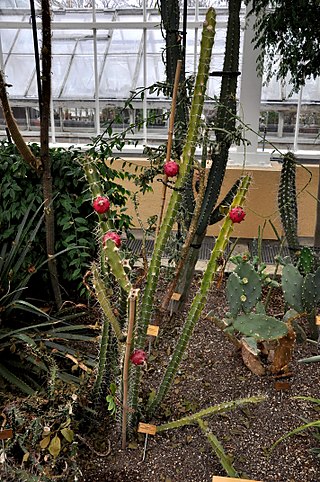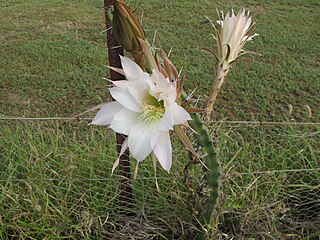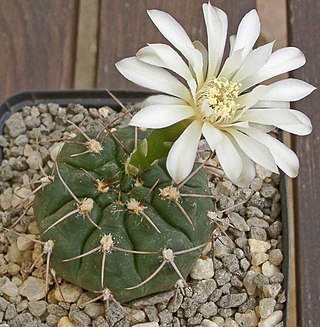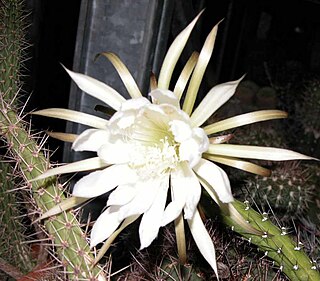
Stetsonia coryne, the toothpick cactus, is the sole species in the cactus genus Stetsonia. Stetsonia coryne grows to a height of 15 to 25 ft tall. It has white flowers.

Arthrocereus rondonianus is a species of plant in the family Cactaceae. It is endemic to Brazil. Its natural habitats are dry savanna and rocky areas, and it is currently threatened by habitat loss.

Harrisia aboriginum, the west-coast prickly apple or prickly applecactus, is a species of columnar cactus endemic to peninsular Florida, on the Gulf Coast of the counties of Lee, Sarasota County, and Charlotte. Only 12 occurrences are known, and the species is threatened by horticultural collection, shading from fire suppression, competition from invasive flora, and most of all habitat destruction. It is a federally listed endangered species of the United States.

Harrisia bonplandii is a species of cactus. The cactus plants in the Gran Chaco are generally called tuna and this specific variety reina de la noche. Fruits and roots are edible and well known to the native nations of the Gran Chaco.
Harrisia gracilis is a species of cactus found in Jamaica.

Harrisia fragrans is a rare species of cactus known by the common name fragrant prickly apple. It is endemic to Florida, where it is known only from St. Lucie County. The plant's habitat has been almost completely consumed by development, leading to its rarity. It is a federally listed endangered species of the United States.

Harrisia martinii, commonly called the Martin applecactus, is a species of night-blooming, rope-like cacti native to South America. With large showy flowers that attract the hawk moth, it is considered by some a useful landscape plant in areas that do not freeze.

Harrisia pomanensis is a species of cactus.

Harrisia portoricensis is a species of cactus in the genus Harrisia. Its common names include higo chumbo and Puerto Rico applecactus.

Harrisia tortuosa is a species of cactus in the Trichocereeae tribe.

Gymnocalycium ochoterenae is a species of Gymnocalycium from Argentina.

Weberbauerocereus rauhii is a species of Weberbauerocereus from Peru.

Matucana intertexta is a species of cactus in the genus Matucana, native to Peru. It has gained the Royal Horticultural Society's Award of Garden Merit.

Matucana aureiflora is a species of Matucana found in Peru.

Weberbauerocereus albus is a species of Weberbauerocereus from Peru.

Harrisia earlei is a species of cactus endemic to Cuba.

Harrisia tetracantha is a species of cactus found in Bolivia.
Harrisia adscendens is a species of cactus found in Brazil.

Harrisia eriophora is a species of cactus found in Cuba.
Harrisia fernowii is a species of cactus found in Cuba.

















